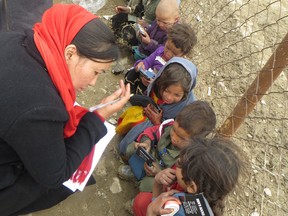INepness ol Canada's Refugee Resettlement System
"She did not apply for a temporary resident visa. She applied for a TRP [Temporary Resident Permit].""She has already been beaten to within an inch of her life by the Taliban."Matthew Behrens, co-ordinator, Rural Refugee Rights Network"Presumably they're [Canada Immigration services] overwhelmed. But they didn't even read the application properly.""We have met with a number of Members of Parliament and there has been nothing. The minister has the discretion to approve the application. It's very discouraging."Bessa Whitemore, retired Carleton University social work professor"When we get support for women’s rights in Canada from Afghanistan, we know we have trouble here.""Farzana was a high-profile women’s rights activist. She worked for the [former] president of Afghanistan on women’s rights issues. She belongs to an ethnic minority [Adell Ghadiya is Hazara, an ethnic group that has faced persecution in Afghanistan].""She meets all the criteria. This is the fourth time she’s in exile and she’s lived in some of the very, very bad conditions. It’s not a joke. Our government needs to step up and get this woman over here."Sharen Craig, retired English teacher
 |
Canada has been notoriously lax for over a year in meeting its obligations surrounding a promise by the federal government that it would rescue Afghan citizens for whom life in Afghanistan has become impossible. These are men and women who gave support and took positions with the Canadian military and diplomatic mission in Afghanistan when the U.S.-led UN and NATO mission entered the country to dispel the Taliban and to search for members of al-Qaeda being sheltered by the Taliban in the wake of 9/11.
Their security and safety in Afghanistan disappeared with the departure of U.S. and allied troops and their diplomatic missions, as the Taliban through a nationwide violent campaign, swept back into power, overturning the elected government of Afghanistan, and occupying the capital, Kabul. The Taliban undertook a mission to seek out, imprison and murder Afghan citizens who were part of the former government, and Afghans who had worked alongside foreign governments in the country.
Many Afghan refugees, after seeking temporary haven in neighbouring countries, did make their way to Canada to take up permanent residency, as promised them by the government. Relatively few were rescued directly from the Kabul airport in the final, confused and hectic days of foreign government departures, as a result of unpreparedness; by no means all departing countries, but certainly Canada.
Special Temporary Resident Permits for Protection became an emergency Canadian vehicle to allow desperate Afghans with connections to Canada to claim priority and swifter entry to the country. Farzana Adell Ghadiya is an Afghan social and humanitarian worker who applied for the TRP yet she received an advisory that her application was rejected for a visitor's visa, a visa she had never applied for. Ms. Adell Ghadriye certainly qualified for the TRP, given her exceptional circumstances.
Leaving her network of Canadian supporters who have diligently been trying to bring her to Canada under the auspices of the government's own rescue support operation, upset and confused at the turn of events. It seemed clear to them that immigration officials had casually laid aside the application describing life-threatening circumstances should the woman return to Afghanistan.
This is a woman who engaged in building girls' schools and maternity hospitals, a woman who was employed as chief of staff for the UN Commission on the Status of Women, in the office of the former president of Afghanistan, Ashraf Ghani. Bessa Whitemore, the retired professor of social work, offered a place to stay in Canada for Adell Ghadiya, once she arrives in Ottawa.
The third country in which she has been waiting out Canada's immigration decision under the TRP program might end up deporting her. The unnamed country was where she had been in August 2021 when the Taliban returned to power. She had been delivering equipment and materials for a trade school for women, but her visa for that country is due to expire at the end of 2022.
Her Canadian supporters, because she is unable to work in that third country of temporary haven, have been supporting her financially to pay for rent, food and other necessities. Those same supporters have good reason to question the government of Canada's commitment to resettling up to 40,000 Afghan refugees in Canada, as 'quickly and safely' as possible.
"It’s so hard to live as a refugee with an unknown future. I can’t work. I can’t have a job. I have no rights here. I can’t continue my advocacy work for the many women and girls in Afghanistan.”"Afghanistan has a lower youth literacy rate especially for girls and women because of the decades of war that deprived girls of that time. Building schools providing education is an essential capacity building in the country’s progress toward peace, security and sustainable economic development."Afghan women's rights activist Farzana Adell Ghadiya"Education brings empowerment and enlightenment to the future of girls and women to defend their rights."
:format(webp)/https://www.thestar.com/content/dam/thestar/news/canada/2022/03/18/this-afghan-womens-rights-activist-wants-to-come-to-canada-but-the-rules-keep-her-from-applying/farzana_adell_ghadiya.jpg)
Labels: Afghan Refugees, Government of Canada, Immigration, INcompetence

0 Comments:
Post a Comment
<< Home